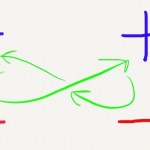“The laws of nature are but the mathematical thoughts of God.” Euclid, in Euclid’s Elements.
“We have established as the limit of this art [mathematics] its usefulness in measuring and counting.” Cicero, as quoted by Leonard Mlodinow.
“The powerful thinkers are those who make connections, think logically, and use space, data, and numbers creatively.” Jo Boaler, author of Mathematical Mindsets
If Az House Bill 2278 passes, students will no longer be required to take Algebra 2 to graduate high school. But they will still need to take four years of math.
As reported in the media, opponents to the law argue that we lose our competitive edge if American students don’t take as much advanced math as possible. In Algebra 2, at my school, we focus on conceptual understanding, analysis, and process, leaving concrete applications to a final unit in the last few weeks of the year. Once in a while a student will see the beauty in the subject and say something like, “That’s crazy!!” This approximates, without quite bringing God into it, Euclid’s point.
Advocates for eliminating the Algebra 2 requirement line up behind Cicero and would like to see more practical math, like personal finance, taught instead of more advanced abstract math. Seriously, I bet it’s been awhile since you analyzed something like f(x) = -10log(4) (x + 2), like my students did on Friday’s quiz (and which after the final exam in May, most never will again).
And so the battle lines are drawn. As in most issues, different parties represent competing interests, and the choice is all of one or all of the other. Both sides could argue that students do become the powerful thinkers that Boaler describes. As proof, they could point to all of the posters we have on our walls illustrating the Standard Mathematical Practices, like “Construct viable arguments and critique the reasoning of others.”
But what if powerful thinking became the goal of math, instead of a hit or miss effect? My students did well on Friday’s quiz because we did tons of sample problems. Not many cared about the math or found it interesting. You can fairly put that on me. But I can fairly put their annoyance at math on a system that demands we rush through more learning goals than ever. Granted, most students pass, but then all is forgotten in an adulthood where it is perfectly acceptable to declare, “I’m not a math person.”
So, what about something like this? First, eliminate Algebra 2 as a graduation requirement. Then, expand Algebra and Geometry curricula to to three semesters each. The expanded courses would not add more content but would go deeper into the content than before. And here’s where competing interests could be accommodated and the Jo Boaler quote becomes relevant. Each topic could include multiple tasks, both abstract and concrete, that require creativity, number-sense, logic, and the like that would develop powerful thinking skills. Ideally, the stamina to work longer on hard problems would follow. And, my greatest wish, opportunities for Oh Wow! moments and individual expression would abound. The extra semester would also allow for more real practical examples taken from all fields. (Want to know a secret? Although the concepts in many math books are well explained, their attempts to make content relevant to students and their “real world examples” are pathetic.)
Now, none of these ideas is original. They represent a mash-up of ideas from Paul Lockhart in Mathematician’s Lament: How School Cheats Us Out of Our Most Fascinating and Imaginative Art Form, Andrew Hacker in The Math Myth and other STEM Delusions, Joan Boaler’s book, of course, and many others.
Abundant free online material exists to ease the transition to any such change to math requirements. For example, Open Up Resources and Boeler’s Week of Inspirational Math on her YouCubed page offer excellent activities to expand understanding without adding more topics. Similarly, the Math Assessment Project offers tons of applied tasks for students. So, everything proposed here is happening somewhere, although inconsistently and not as the foundation of math curriculum.
Which brings us to a high school student’s last required math class. Algebra 2, Calculus, Business Math, and so forth should certainly be offered for students who know they’re going to major in a field that demands advanced math knowledge. But most students would take a class with a catchy and original title like MATH 4.
With no new math per se, the class would advance the powerful thinking developed in the three semester algebra and geometry classes. One unit might take a deep dive into Numbers in the News. Another might cover case histories about when the pros get it wrong, like in the Hyatt Regency walkway collapse. (Spoiler alert – people usually die.) Check out Humble Pi: When Math Goes Wrong in the Real World, by Matt Parker for more examples. Another unit might cover rational risk assessment; still another might cover Math Without Numbers, and on and on.
A friend, who’s a math professor at a university in Texas, read my last post and said, “Many people want change, but it can be hard to sift through what would be a meaningful and beneficial change. But better math for everyone would be a great thing!”
And therein lie the questions the Arizona Legislature should be grappling with: What is the nature of better math for everyone; what are the features of the best math requirements; and, finally, is Algebra 2 the best path to those ends?
(Image “Math Matters” by Simona)









